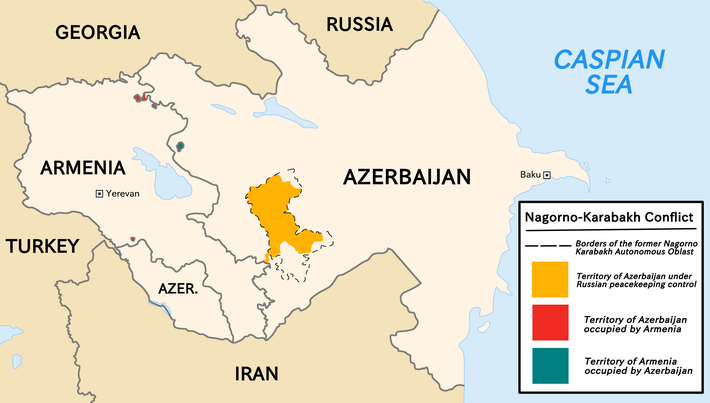ForumIAS announcing GS Foundation Program for UPSC CSE 2025-26 from 27th May. Click Here for more information.
Source: The post is based on the article “Why does the Azerbaijan-Armenia conflict over Nagorno-Karabakh remain unresolved?” published in The Hindu on 16th August 2022.
What is the News?
The conflict between Armenia and Azerbaijan over Nagorno-Karabakh has been at the centre of three major wars and multiple clashes for decades. The recent flare-up began after Azerbaijan claimed that it had captured the territory in Karabakh in retaliatory action.
What is the Nagorno-Karabakh dispute?

Nagorno-Karabakh is a disputed territory internationally recognized as part of Azerbaijan but mostly governed by the Republic of Artsakh, de facto independent state with an Armenian ethnic majority backed by neighbouring Armenia.
Origin of the conflict: Modern-day Armenia and Azerbaijan became part of the Soviet Union when it formed in the 1920s. Nagorno-Karabakh was an ethnic-majority Armenian region, but the Soviets gave control over the area to Azerbaijani authorities.
– It was only as the Soviet Union began to collapse in the late 1980s that Nagorno-Karabakh’s regional parliament officially voted to become part of Armenia.
– Azerbaijan sought to suppress the separatist movement, while Armenia backed it. This led to full-scale war. Armenian forces gained control of Nagorno-Karabakh and areas adjacent to it before a Russian-brokered ceasefire was declared in 1994.
– After that deal, Nagorno-Karabakh remained part of Azerbaijan, but since then has mostly been governed by a separatist, self-declared republic run by ethnic Armenians and backed by the Armenian government.
What is India’s stand on the Nagorno-Karabakh dispute?
With Armenia, India has a friendship and cooperation treaty (signed in 1995) which incidentally, would prohibit India from providing military or any other assistance to Azerbaijan.
In the case of Azerbaijan, ONGC/OVL has made investments in an oilfield project in Azerbaijan and GAIL is exploring the possibilities of cooperation in LNG.
Azerbaijan also falls on the International North-South Transport Corridor (INSTC) route, connecting India with Russia through Central Asia. It can also connect India with Turkey and beyond through the Baku-Tbilisi-Kars passenger and freight rail link.
Armenia extends its unequivocal support to India on the Kashmir issue whereas Azerbaijan not only opposess but also promotes Pakistan’s narrative on this issue.
Under these circumstances, India has taken a principled position in the conflict between Armenia and Azerbaijan and supported moves for its peaceful resolution.




